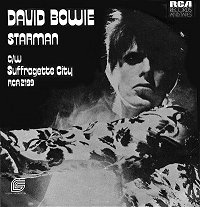Starman (song)
| "Starman" | |||||||
|---|---|---|---|---|---|---|---|
 |
|||||||
| Single by David Bowie | |||||||
| from the album The Rise and Fall of Ziggy Stardust and the Spiders from Mars | |||||||
| B-side | "Suffragette City" | ||||||
| Released | 28 April 1972 | ||||||
| Format | 7" single | ||||||
| Recorded |
Trident Studios, London 4 February 1972 |
||||||
| Genre | Glam rock | ||||||
| Length | 4:16 | ||||||
| Label |
RCA 2199 |
||||||
| Writer(s) | David Bowie | ||||||
| Producer(s) | David Bowie and Ken Scott | ||||||
| David Bowie singles chronology | |||||||
|
|||||||
|
|||||||
"Starman" is a song by David Bowie, recorded on 4 February 1972 and released as a single that April. The song was a late addition to The Rise and Fall of Ziggy Stardust and the Spiders from Mars, included at the insistence of RCA’s Dennis Katz, who heard a demo and loved the track, believing it would make a great single. It replaced the Chuck Berry cover "Round and Round" on the album.
The lyrics describe Ziggy Stardust bringing a message of hope to Earth's youth through the radio, salvation by an alien 'Starman'. The story is told from the point of view of one of the youths who hears Ziggy. According to Bowie himself, speaking to William S. Burroughs for Rolling Stone magazine in 1973, Ziggy Stardust is not the Starman but merely his earthly messenger – contrary to received opinion which often paints Ziggy as an extraterrestrial. The song has inspired interpretations ranging from an allusion to the Second Coming of Christ, to an accurate prediction of the plot for the film Close Encounters of the Third Kind (1977).
The music is in a gentle pop rock vein, featuring prominent acoustic guitar and a string arrangement by Mick Ronson, not dissimilar to the style of Bowie's previous album Hunky Dory (1971). The chorus is loosely based on Harold Arlen's "Over the Rainbow" from the film The Wizard of Oz, alluding to the "Starman"'s extraterrestrial origins (over the rainbow) (the octave leap on the word "Starman" is identical to that on the word "Somewhere" in "Over the Rainbow"). Other influences cited for the track are the T. Rex songs "Telegram Sam" and "Hot Love" (the "boogie" references and "la la la" chorus) and Holland–Dozier–Holland's "You Keep Me Hangin' On" (the morse code-esque guitar and piano breaks).
...
Wikipedia
